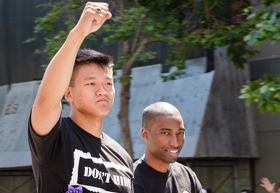A 63-33 vote today in the US Senate brought a 17-year-old policy that bans openly gay, lesbian or bisexual people from United States military service closer to repeal![]() .
.
The vote comes after years of opposition to the ban by US gay rights groups, including, just last month, a direct action by rights activists who handcuffed themselves to the fence around the White House. The action led to the arrests of the activists, including former Army Lt Dan Choi, one of the most prominent critics of the policy.

(CC photo: firstwavedown)
The Iraq war veteran tweeted his delight with the vote: “Today we stand taller declaring: ‘I am somebody.’”
The policy will remain in effect even after President Obama signs the repeal into law, as it makes repeal contingent upon certification by US Defense Secretary Robert Gates. Following the vote, the Servicemembers Legal Defense Network was quick to release a statement warning US service members that they’re still at risk.
The bottom line is DADT is still in effect and it is NOT safe to come out.
The release also reminds transgender service members that, regardless of the status of Don’t Ask, Don’t Tell, they “remain at risk,” as the policy only relates to gay, lesbian or bisexual service members. In a joint statement with the National Center for Transgender Equality, they warn trans people that they can still be discharged for being “considered medically unfit because of Gender Identity Disorder.” (pdf)
The vote comes only weeks after the Canadian military published new rules allowing its transgender members to wear the uniform of their target gender.
Canada’s Armed Forces has allowed out gays, lesbians and bisexuals since 1992, when Justice Minister Kim Campbell, responding to the pressure of related court cases, lifted the ban on gays in the military.
 Why you can trust Xtra
Why you can trust Xtra


